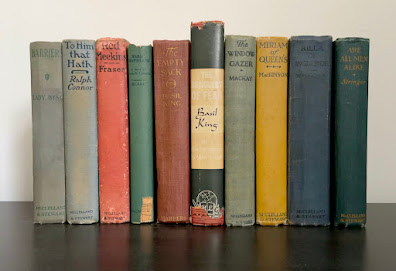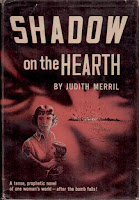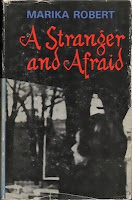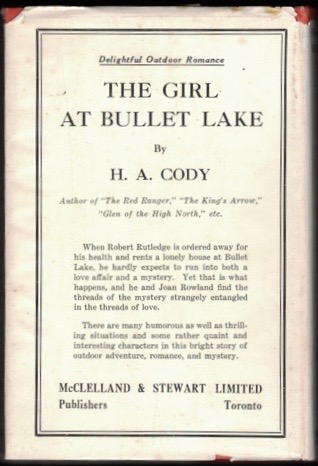Blencarrow
Isabel Mackay
Toronto: Thomas Allen, 1926
307 pages
The author's final novel, published two years before her death,
Blencarrow begins in a sunny, lighthearted manner:
Euan Cameron, aged twelve, sat upon the fence and bent a darkling eye upon his father at the woodpile. The woodpile was in the Cameron's back yard, and the Camerons' back yard was in Blencarrow, and Blencarrow was a small, but exceedingly important, town somewhere around. So now you know exactly where Euan sat.
Do not be deceived.
Blencarrow fits in with Mackay's other novels:
The House of Windows (1912), dealing with child abduction and worker exploitation;
Up the Hill and Over (1917), about mental illness and drug addiction; and
The Window-Gazer (1921), in which post-traumatic stress disorder and racism figure.
(I've yet to read Mackay's 1919 novel
Mist of Morning.)
Named after the fictitious town in which the action is set (see:
Woodstock, Ontario),
Blencarrow focusses on four children as they grow into adulthood. Euan is the least interesting. I blame his family.
The worst that can be said about the Camerons is that grim patriarch Andrew finds no contentment in his achievements. Contrast Euan's home life with that of best friend Garry, who is being raised in the Anglican manse by a benevolent uncle, Reverend James Dwight, and housekeeper Mrs Binns. Garry's mother is dead; there's no mention of his father. Euan and Garry's sometime friend Conway de Beck – Con-of-the-Woods – lives with his aunt, a Theosophist, who is something of an outcast in Blencarrow. Con doesn't care; he's happier in the woods, hence the nickname.
All three boys are attracted to Kathrine Fenwell. She isn't the prettiest girl in Blencarrow – that would be her sister, Gilda – but she has by far the strongest character. Kathrine needs this as the daughter of the town drunk. Owing to his good looks and pedigree, Blencarrow had once considered her father, Gilbert Fenwell, a man of great promise. Shortly after the death of his own father, the respected Colonel Fenwell, Gilbert took his healthy inheritance to the big cities, where he invested in "Big Business." He married Kathrine's mother, Lucia, and began construction of what was to have been the grandest house in all of Blencarrow:
It was not so much a house as a half-house, the front half benign-existent save as a tracing on a blue-print. The back half, arrested abruptly in its normal growth, had remained fixed, as by some strange enchantment, in all the ugliness of outraged proportion. At first, scaffolds had decorated it, but, bit by bit, the scaffolding had disappeared and nothing had taken its place. No steps below, no eaves above, broke the wide flatness of is face. The front door was not properly a front door, but a door leading into a hallway that was not there. The windows were not windows really, but glassed-in entrances to dining-rooms and drawing-rooms – which lived and had their being in a fourth dimension.
The lengthy description, one of my favourite Mackay passages, ends:
It stood well back in its neglected garden, the ghost of something once new and fresh and promising, On its strange, flat face was a negation of all hope. It was a house which had given itself up.
Blencarrow had given it up also. While the scaffolding still stood, Blencarrow had pointed it out to strangers as "the unfinished Fenwell place." But this they did no longer, for a thing which never will be finished is the most finished thing of all.
The odd appearance of Gilbert Fenwell's house, "the town's only curiosity," serves as a reminder that Big Business "wiped him off the financial map as a child rubs out a name on a plate." Work stopped,
 |
The Globe & Mail
14 December 1926 |
and he returned to Blencarrow as a man who had left his money and promise behind: "Gilbert Fenwell, as a possibility, had ceased to be, but Gilbert Fenwell, as an actuality, lived on."
If only he hadn't.
Gilbert doesn't figure nearly so much in
Blencarrow as Kathrine, Euan, Garry, and Con-of-the Woods, but his influence on the plot is greater. As a young child, Gilda is sent away to live with her aunt after having being beaten by Gilbert. Her forehead bears a scar that she hides with her long red hair. He takes his failings out on his family. He beats Lucia. He beats Kathrine. His poison is pervasive. All too real, I can't think of another character like him this early in our literature, nor can I think of anything similar to this exchange between Kathrine and her mother:
"Gilda doesn't care for anyone in any way – except you, of course," she added hastily, as she saw the tightening of her mother's face.
Lucia laid down her sewing. Into her eyes had come the strange blank look which Kathrine had grown to dread.
"No," she said softly. "You can't have it both ways. If Gilda cares for no one, why would she care for me? And that is justice, too. I hated her you see."
"You hated Gilda?" – in wonderment.
Lucia nodded. "Before she was born I hated her. I would have denied her life if I could. I had come to hate life so! To pass it on seemed a horrible thing... horror... all horror –"
A remarkable passage in a remarkable novel, it leads me to ask again how it is that we've forgotten Isabel Mackay.
Bloomer: As in life, there's humour to be found in even the darkest of tales.
Blencarrow is no exception. Its plot is governed by effects wrought of domestic violence, and yet there are chapters reminiscent of Stephen Leacock. My favourite involves the decision of the Presbyterian Ladies' Affiliated Societies of
Mariposa Blencarrow to organize a "Festival of Nations." However, the greatest laugh comes in the form of a
bloomer found on the ninety-fifth page. This occurs as young Garry begins religious studies with the goal of becoming a celibate Anglican clergyman like his Uncle James. In this pursuit, he finds a role model in Prof Adam Harmon, leading to this, um, exchange, which begins with Harmon's words of advice:
"Keep your mind clear as long as it is clear... Fill it with the spiritual things you love. Hold fast through everything to the decision you have made. Nothing can conquer you – except yourself."
"Oh, I think I've got myself well in hand," said Garry cheerfully.
Object and Access: A bland green hardcover
sans dust jacket (which I've never seen), as far as I know it's the only MacKay book to be attributed to "Isabel Mackay" and not "Isabel Ecclestone Mackay." I purchased my copy in 2013 from bookseller
Grant Thiesen. Price: US$7.99. In reading it, I came across this bonus:
The Thomas Allen edition was a split-run with Houghton Mifflin. It appears there were no others.
Blencarrow can be found at Library and Archives Canada and sixteen of our university libraries. The Woodstock Public Library excluded, Canada's public libraries fail us.
Related posts:
























































